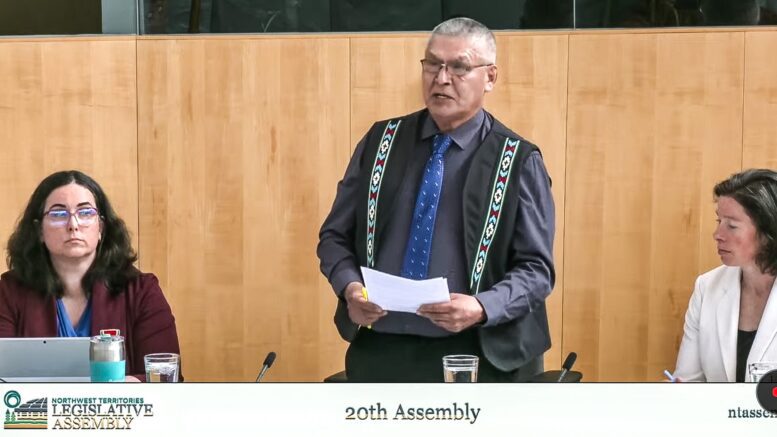The territorial government announced today that improvements to the Income Assistance program and the new Income Assistance for Seniors and Persons with Disabilities program will come into effect July 1.
 Changes to the regular Income Assistance program include: Aligning benefit levels with the Northern Market Basket Measure; increasing income exemptions and reducing refusal periods to minimize financial hardship for clients.
Changes to the regular Income Assistance program include: Aligning benefit levels with the Northern Market Basket Measure; increasing income exemptions and reducing refusal periods to minimize financial hardship for clients.
But perhaps the most controversial for many Regular MLAs in Statements and Oral Questions today in the NWT Assembly was removing the requirement to seek and maintain employment.
George Nerysoo, MLA for Mackenzie Delta, said there needs to be an incentive to get off Income Assistance.
“What we see is that once people start, they do not get out income assistance. I do not want to penalize people who have medical conditions or cannot work. These people need the support of the government. But unfortunately, I see a lot of people who should be working but instead are on income assistance.
“How do you address the cycle of dependency that carries through the families and generations on income assistance? How can we get people working? The government needs to look at the policy and make changes that incentivize people to work and make productive choices.”
Jane Weyallon-Armstrong, is the MLA for Monfwi. She reminded all that Income Support was created as a temporary solution to be used by clients for a short period of time.
“Income support does help people pay their bills and survive. But we all know that challenge with this program … once people are on income support, they get comfortable. There is no incentive to get, to get out of the system.
“Income support should be designed to help people get back to work, too. A job is one reason that can help people wake up early every day, stay sober, be productive and become self-sufficient. We need to look at different ways of delivering income assistance, so we can truly support people to go back to get back to work.”
Robert Hawkins, MLA for Yellowknife Centre, called Income Assistance the “back-dooring of a very, very basic income.”
And Kate Reid, MLA for Great Slave, said Income Assistance is paternalistic in nature.
“I would also add that is that it is colonial in nature, because it makes people dependent on the program and disincentivizes participation in the labour force.”
The GNWT stated that various changes to the current Income Assistance programs will cost $5 million annually. The changes were guided by engagement with Indigenous governments, current and former clients, non-governmental organizations, various GNWT departments, and landlord and utility providers.





